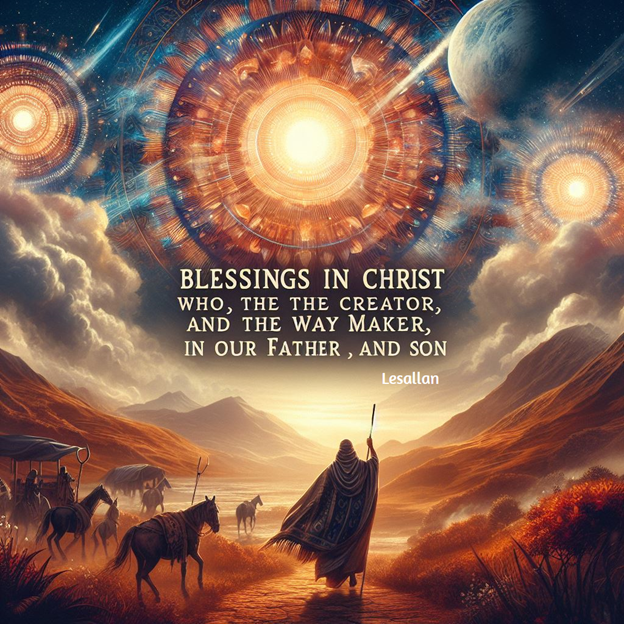
Holiness Without Social Holiness
Lesallan Bostron
Ohio Christian University
THE3360 Theology of John Wesley (ONLSP24)
Dr. Steven Gerig
January 23, 2024
Holiness Without Social Holiness
In this essay and devotional, I will explore the concept of social holiness as articulated by John Wesley, the founder of the Methodist movement. I will argue that social holiness is an essential aspect of Christian faith and practice and that it involves caring for the poor, the oppressed, and the marginalized, as well as resisting racism, xenophobia, and other forms of injustice. I will also discuss how social holiness is connected to personal holiness, prayer, and the gospel of Jesus Christ. I will draw on the examples of Wesley, Billy Graham, and other Christian leaders who have demonstrated social holiness in their lives and ministries.
As theologian John Wesley wrote, “There is no holiness without social holiness.” Racism and xenophobia are unacceptable and must be overcome to create a better world. This problem was first seen in the first-century Church of Jerusalem (Acts 6:1-7, KJV), where food was distributed to those who were overlooked due to their nationality. Unfortunately, in today’s world, we seldom see Christian leaders solving discriminatory situations by entrusting that ministry to the group that is being neglected due to their race or culture.
Next, we have the Sinner prayer and the basic prayer version by Billy Graham:
Lord Jesus, I am a sinner.
I believe You died for my sins so I could be forgiven.
I receive You as my Lord and Savior.
Thank You for coming into my life.
Amen.
~Billy Graham
As students, we have been tasked with reflecting on some thought-provoking questions that delve into the intersection of faith, ethics, and social justice. Specifically, we were asked to consider whether injustice in the name of Christianity should ever be tolerated, what forms of injustice exist within areas where the Church is present, and whether the Church should be involved in combating injustice. It’s important to acknowledge that there may be a diversity of opinions on these matters based on individuals’ unique beliefs, experiences, and interpretations of religious texts. With that said, here are some general reflections from this student.
Addressing Injustice and Poverty: Religious teachings, such as those found in Christianity, underscore the importance of compassion, charity, and justice. Some view this as a call to tackle systemic injustices and alleviate poverty. However, it is not a matter of choosing between reforming unjust systems or prayer. Rather, many believe that prayer and action go together, with prayer offering, strength and guidance while action serves as a tangible expression of faith.
Religious Injustice: The principles of peace, love, and justice are fundamental to most religions, such as Christianity. When acts of injustice are conducted under the guise of religion, it is considered a perversion of these values. The Church’s Function: Depending on the perspective, religious institutions can play different roles in addressing social matters. While some view the Church as a solely spiritual entity, others see it as a spiritual and social institution obligated to advocate for fairness and parity.
It is essential to acknowledge that these are complex issues with differing viewpoints. Participating in respectful dialogue and seeking to understand multiple perspectives can be incredibly helpful. Let us ask for God’s guidance and support in developing a heart that loves like his, a mind that thinks like his, and a will that acts like his. May God heal our brokenness, forgive our sins, and transform our lives. May God empower us to be his witnesses, ambassadors, and agents of change. Furthermore, may God shape us into holy people who reflect his glory and grace to all we encounter.
Racism is the Sin: This sin racism is a sin that contradicts the gospel of Jesus Christ, who died for all people and created one new humanity in himself (Ephesians 2:14-16, KJV). As followers of Christ, we are called to love our neighbors as ourselves, regardless of their race, ethnicity, culture, or nationality. We are also called to stand against any form of oppression, injustice, or discrimination that devalues the image of God in others.
I have shown that social holiness is vital to Christian faith and practice. Social holiness means loving God and our neighbors, especially those who are different from us or suffer from injustice. Social holiness also means following the example of Jesus, who died for all people and created a new humanity in himself. Social holiness is not a separate or optional aspect of Christianity but a natural and necessary expression. I challenge myself and my readers to embrace social holiness as a way of life and seek God’s guidance and empowerment. As Wesley said, “There is no holiness without social holiness.”
“Blessings in Christ, who is the Creator and Way Maker, and in our Father and Son.”
~Lesallan



